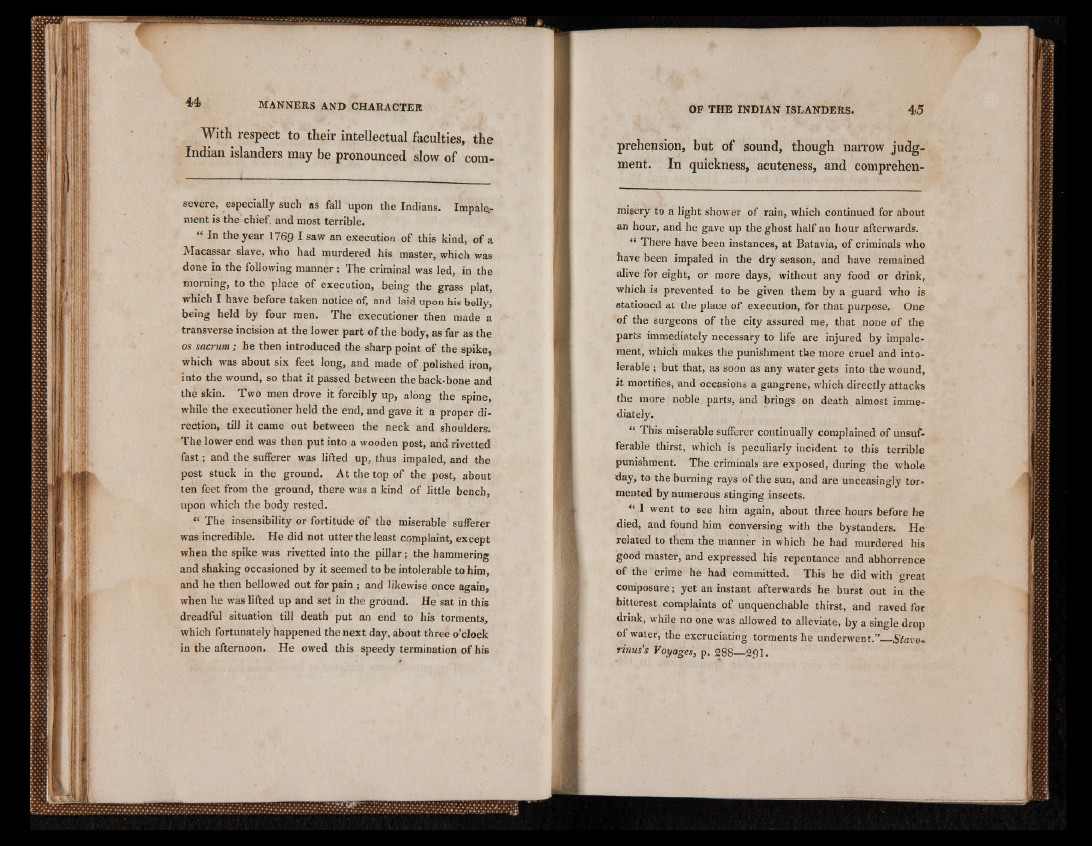
With respect to their intellectual faculties, the
Indian islanders may be pronounced slow of comsevere,
especially such as fall upon the Indians» Impalement
is the chief, and most terrible.
“ I*1 the year 1769 I saw an execution of this kind, of a
Macassar slave, who had murdered his master, which was
done in the following manner: The criminal was led, in the
morning, to the place of execution, being the grass plat,
which I have before taken notice of, and laid upon his belly,
being held by four men. The executioner then made a
transverse incision at the lower part of the body, as far as the
os sacrum ; he then introduced the sharp point of the spike,
which was about six feet long, and made of polished iron,
into the wound, so that it passed between the back-bone and
the skin. T«vo men drove it forcibly up, along the spine,
while the executioner held the end, and gave it a proper direction,
till it came out between the neck and shoulders.
The lower end was then put into a wooden post, and rivetted
fa s t; and the sufferer was lifted up, thus impaled, and the
post stuck in the ground. At the top of the post, about
ten feet from the ground, there was a kind of little bench,
upon which the body rested.
“ The insensibility or fortitude of the miserable sufferer
was incredible. He did not utter the least complaint, except
when the spike was rivetted into the pillar; the hammering
and shaking occasioned by it seemed to be intolerable to him,
and he then bellowed out for pain ; and likewise once again,
when he was lifted up and set in the ground. He sat in this
dreadful situation till death put an end to his torments,
which fortunately happened the next day, about three o’clock
in the afternoon. He owed this speedy termination of his
prehension, but of sound, though narrow judgment.
In quickness, acuteness, and comprehenmigery
to a light shower of rain, which continued for about
an hour, and he gave up the ghost half an hour afterwards.
“ There have been instances, at Batavia, of criminals who
have been impaled in the dry season, and have remained
alive for eight, or more days, without any food or drink,
which is prevented to be given them by a guard who is
stationed at the place of execution, for that purpose. One
of the surgeons, of the city assured me, that none of the
parts immediately necessary to life are injured by impalement,
which makes the punishment the more cruel and intolerable
; but that, as soon as any water gets into the wound,
it mortifies, and occasions a gangrene, which directly attacks
the more noble parts, and brings on death almost immediately.
“ This miserable sufferer continually complained of unsuf-
ferable thirst, which is peculiarly incident to this terrible
punishment. The criminals are exposed, during the whole
day, to the burning rays of the sun, and are unceasingly tormented
by numerous stinging insects.
“ I went to see him again, about three hours before he
died, and found him conversing with the bystanders. He
related to them the manner in which he had murdered his
good master, and expressed his repentance and abhorrence
of the crime he had committed. This he did with great
composure; yet an instant afterwards he burst out in the
bitterest complaints of unquenchable thirst, and raved for
drink, while no one was allowed to alleviate, by a single drop
of water, the excruciating torments he underwent.” Stavorinus's
Voyages, p. 288—291.